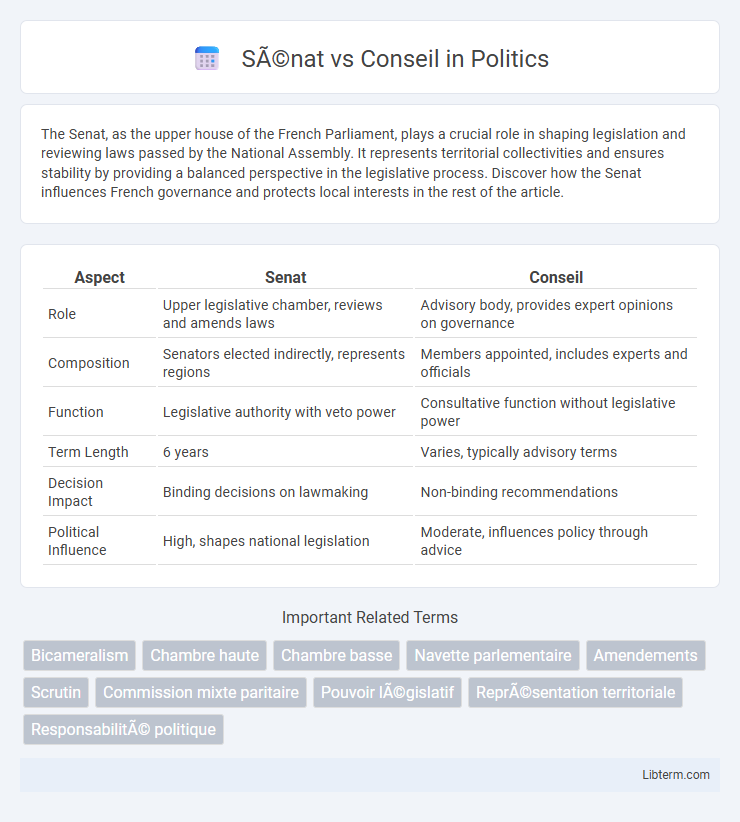The Senat, as the upper house of the French Parliament, plays a crucial role in shaping legislation and reviewing laws passed by the National Assembly. It represents territorial collectivities and ensures stability by providing a balanced perspective in the legislative process. Discover how the Senat influences French governance and protects local interests in the rest of the article.
Table of Comparison
| Aspect | Senat | Conseil |
|---|---|---|
| Role | Upper legislative chamber, reviews and amends laws | Advisory body, provides expert opinions on governance |
| Composition | Senators elected indirectly, represents regions | Members appointed, includes experts and officials |
| Function | Legislative authority with veto power | Consultative function without legislative power |
| Term Length | 6 years | Varies, typically advisory terms |
| Decision Impact | Binding decisions on lawmaking | Non-binding recommendations |
| Political Influence | High, shapes national legislation | Moderate, influences policy through advice |
Introduction au Sénat et au Conseil
The Senat serves as the upper house of the French Parliament, playing a crucial role in legislative review and representing territorial collectivities. The Conseil, commonly referring to the Conseil d'Etat, acts as the supreme administrative court and provides advisory opinions on legislative matters. Both institutions ensure checks and balances within the French political system, with the Senat focusing on lawmaking and the Conseil overseeing administrative justice and legal guidance.
Origine et Évolution Historique
The Senat originated in ancient Rome as a council of elders advising magistrates, evolving through the French Revolution into a parliamentary chamber representing territorial collectivities. The Conseil, particularly the Conseil d'Etat, emerged from the Napoleonic era to serve as the highest administrative court and governmental advisor. Both institutions reflect France's adaptation of governance structures from aristocratic roots to modern administrative and legislative functions.
Composition et Représentation
The Senat is composed of 348 senators elected indirectly by an electoral college representing local authorities, ensuring representation of territorial collectivities, whereas the Conseil d'Etat comprises around 300 members appointed based on administrative law expertise to advise the government and act as the supreme administrative court. Senators serve six-year terms with half renewed every three years, reflecting regional diversity, while Conseil d'Etat members include high-ranking civil servants and jurists appointed for their administrative and legal experience to oversee public administration's legality. The Senat emphasizes political representation of territories, whereas the Conseil focuses on legal advisory and judicial functions without electoral representation.
Fonctions et Pouvoirs Législatifs
The Senat joue un role crucial dans le processus legislatif en examinant, amendant et adoptant les projets de loi proposes par l'Assemblee nationale, contribuant ainsi a l'equilibre des pouvoirs legislatifs. Le Conseil constitutionnel, quant a lui, ne cree pas les lois mais controle leur conformite a la Constitution, assurant la regularite et la legitimite des actes legislatifs. Ainsi, le Senat participe activement a la creation des lois tandis que le Conseil garantit leur validite juridique au sein du systeme politique francais.
Processus de Prise de Décision
The Senat and Conseil follow distinct processus de prise de decision reflecting their institutional roles; the Senat deliberates laws with a focus on legislative scrutiny while the Conseil examines legal conformity and governance through advisory opinions and rulings. Decision-making in the Senat involves parliamentary debates, committee evaluations, and amendments before voting, emphasizing democratic representation and lawmaking. In contrast, the Conseil's process relies on legal expertise and procedural reviews to ensure alignment with constitutional principles and administrative legality.
Comparaison des Rôles Institutionnels
Le Senat represente les collectivites territoriales et joue un role legislatif en examinant, modifiant et votant les projets de loi. Le Conseil constitutionnel verifie la conformite des lois a la Constitution et protege les droits fondamentaux par le controle de constitutionnalite. Ces deux institutions assurent un equilibre institutionnel, le Senat agissant dans le processus legislatif et le Conseil garantissant la legalite constitutionnelle des normes.
Influence sur la Politique Nationale
The Senat joue un role cle dans l'examen et la modification des lois, influencant directement la politique nationale en representant les collectivites territoriales. Le Conseil constitutionnel intervient principalement dans le controle de la constitutionnalite des lois, garantissant que les decisions legislatives respectent la Constitution, ce qui impacte indirectement la politique nationale. Ensemble, ces institutions faconnent le cadre legal et institutionnel, modulant la gouvernance et l'application des politiques publiques en France.
Débats et Controverses Actuelles
The Senat in France often faces debates regarding its role as a revising chamber, with controversies centered on its perceived conservatism and the indirect election process that critics argue undermines democratic representation. Discussions around the Conseil constitutionnel focus primarily on its authority to validate legislation and its increasing involvement in political matters, sparking debate over judicial activism versus constitutional guardianship. Current controversies also examine the balance of power between these institutions, especially in legislative oversight and constitutional review, highlighting tensions in France's political system.
Réformes Proposées et Perspectives d’Avenir
The Senat proposals emphasize gradual institutional reforms aimed at enhancing legislative scrutiny and decentralization, focusing on adapting to demographic changes and regional diversity. The Conseil suggests comprehensive constitutional amendments to streamline governance, improve transparency, and strengthen citizen participation through digital tools. Future perspectives highlight debates on balancing tradition with modernization to ensure effective lawmaking and democratic legitimacy in France's evolving political landscape.
Conclusion : Quelle Institution Est Prépondérante ?
Le Senat detient un role cle dans la representation territoriale et l'equilibre des pouvoirs face a l'Assemblee nationale, tandis que le Conseil constitutionnel garantit la conformite des lois a la Constitution, assurant un controle juridictionnel indirect. La preponderance du Senat se manifeste dans le processus legislatif par son influence sur les textes de loi et la defense des collectivites territoriales, alors que le Conseil se positionne comme arbitre institutionnel fondamental. En somme, le Senat est preponderant pour l'elaboration legislative, le Conseil constitutionnel prime dans la validation juridique et constitutionnelle des decisions politiques.
Sénat Infographic

 libterm.com
libterm.com